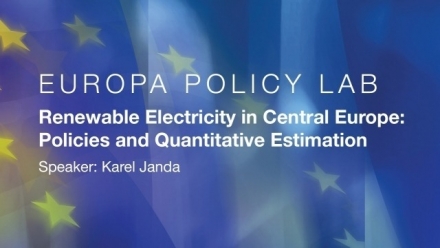Europa Policy Lab: Renewable Electricity in Central Europe: Policies and Quantitative Estimation

This Jean Monnet Europa Policy Lab is jointly presented by the Centre for Applied Macroeconomic Analysis at the Crawford School of Public Policy, and the ANU Centre for European Studies.
Simultaneous promotion of European Energy Union policies aiming for close energy integration and EU 2030 climate and energy policy frameworks sometimes leads to contradictions. Increasing production of solar and wind energy, especially in Germany, puts higher demand on Central European transmission networks, creating significant policy problems for countries close to Germany. Karel will present results of simulation model ELMOD focused on the impact of growing German renewable energy production and nuclear phase-out on electricity transmission networks in Central Europe. He will also provide econometric estimation of merit order effect of photovoltaic electricity generation in the Czech Republic and Slovakia. Karel will show that decrease in wholesale price of electricity caused by merit order effect of photovoltaic electricity generation is either non-existent or quite small as compared to costs of photovoltaic promotion in these two Central European countries.
Karel Janda is a professor at the Department of Banking and Insurance, Faculty of Finance and Accounting, University of Economics, Prague, and Chairman of the Department of Microeconomics and Mathematical Methods, Institute of Economic Studies at Charles University, Prague. He is a holder of RWE chair in Economics at the Institute of Economic Studies, and a research associate of climate change and energy program of the Centre for Applied Macroeconomic Analysis at the Crawford School of Public Policy, ANU. Karel’s research is concerned with microeconomics and applied econometrics in the areas of banking, natural resources and agricultural economics, and the economics of transition. He is currently working on economics of renewable energy resources, especially biofuels and photovoltaics, and on the social cost of carbon. Karel coordinates the EU Horizon 2020 project GEMCLIME on economic modelling for climate-energy policy: www.gemclime.cuni.cz. He regularly teaches graduate classes in microeconomic theory, financial contracting and the microeconomics of banking, and undergraduate classes in finance and banking.
The Centre for Applied Macroeconomic Analysis (CAMA) is located in the Crawford School of Public Policy at ANU and was established in 2003 to bring together economists working on applied macroeconomic and financial market issues throughout Australia and across the globe. Its objectives are to advance research and post-graduate training in applied macroeconomic and financial issues.
The ANU Centre for European Studies (ANUCES) is the oldest research centre in Australia focused on the study of Europe and the European Union. It is an ANU–wide platform for research and collaboration with Europe, with strong links to government and industry. ANUCES focuses the talents of hundreds of researchers, teachers and students on a single site, and proudly promotes interdisciplinary dialogue. It delivers research, education and outreach with the support of the Erasmus+ Programme of the European Union.








